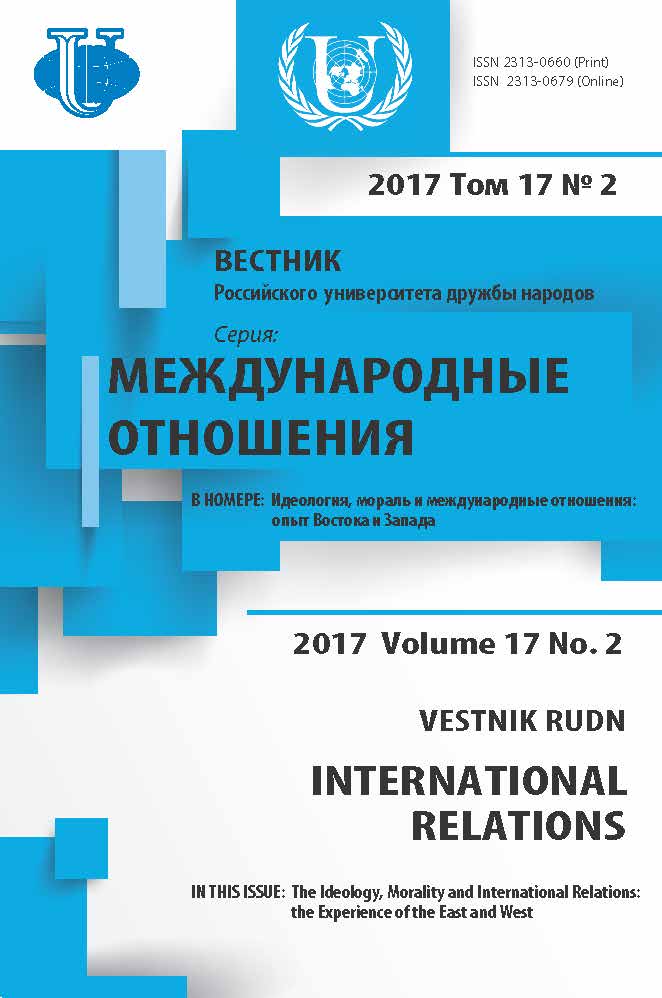The role of cybersecurity in world politics
- Authors: Tsakanyan V.T.1
-
Affiliations:
- Peoples’ Friendship University of Russia (RUDN University)
- Issue: Vol 17, No 2 (2017): The Ideology, morality and international relations: the experience of the East and West
- Pages: 339-348
- Section: PEACE AND SECURITY
- URL: https://journals.rudn.ru/international-relations/article/view/16068
- DOI: https://doi.org/10.22363/2313-0660-2017-17-2-339-348
- ID: 16068
Cite item
Full Text
Abstract
The purpose of this paper is to investigate a significant and increasing role of cybersecurity in world politics. Cybersecurity threats are one of the main national security, public safety, and economic challenges every nation faces in XXI century. Cyberspace is a defining feature of modern life. Individuals and communities worldwide connect, socialize, and organize themselves in and through cyberspace. The existence of numerous cyber security issues on various spheres of life naturally increase political interest in resolving them. The need for cybersecurity is growing ranging from particular cases to national and international - becoming the main problem of diplomacy and world politics. Based on the different national approaches, cybersecurity is seen as the instrument to gain national interests. All countries believe that cybersecurity is an instrument to achieve state’s national interest, since more of the modern theories are focus in the material gain. Meanwhile, some countries see cybersecurity as the tool to influence the adversaries’ perception. This condition build based on the enormous destruction power of cyberattacks. In contrast with the two main approaches, the national security institutions emphasize to the idea, not the material gain. The difference between these national security approaches is the way to use this instrument is used in order to gain the objectives. Indeed, cybersecurity has an important and special role in the world politics.
About the authors
Vladimir Tigranovich Tsakanyan
Peoples’ Friendship University of Russia (RUDN University)
Email: vladt20@mail.ru
Moscow, Russia
References
- Anderson, R., Barton, C., Boehme, R., Clayton, R., van Eeten, M. J. G., Levi, M., Moore, T. & Savage, S. (2012). Measuring the cost of cybercrime. URL: http://weis2012.econinfosec.org/ papers/ Anderson_WEIS2012.pdf (accessed: 13.12.2016)
- Arquilla, J. (1999). Ethics and Information Warfare. In Strategic Appraisal: The Changing Role of Information in Warfare. Ed. by Z. Khalilzad, J. White & A. Marsall. Santa Monica: RAND Corporation
- Bell, D. (1979). The Social Framework of the Information Society). In: The Computer Age: A Twenty-Year View. Ed. by M. L. Dertouzos & J. Moses. Cambridge, Mass
- Buzan, B., Wæver O. & et al. (1998). Security: A new framework for Analysis. Boulder: Lynne Rienner Publishers
- Chobanyan, V. A., & Shahalami, I. Y. (2013). Analysis and synthesis of the requirements for safety systems of objects of critical information infrastructure. Issues of cybersecurity. 1 (1), 17-27
- Denning, D. (2000). Cyberterrorism. Testimony before the Special Oversight Panel on Terrorism Committee on Armed Services. US House of Representatives. URL: http://www.stealth=ss.com/ documents/pdf/CYBERTERRORISM.pdf (accessed: 04/20/14)
- For a discussion of the military revolution that emerged between the two world wars. (1996). In: Military Innovation in the Interwar Period. Ed. by W. Murray & A. R. Millett. Cambridge: Cambridge University Press
- Freedman, L. (1998). International Security: Changing Targets. Foreign Policy, 110, 48-63
- Matveev, B. (2013). Status and prospects of development of national information security industry in 2014. Cybersecurity, 1(1), 61-64
- Metz, S., & Kievit, J. (1995). Strategy and the Revolution in Military Affairs: From Theory to the Police. Strategic Studies Institute. URL: http://www.strategicstudiesinstitute.army.mil/pubs/ display.cfm?PubID=236 (accessed: 04.27.14)
- Rosenzweig, P. (2010). The Organization of the United States Government and Private Sector for Achieving Cyber Deterrence. Deterring Cyberattacks: Informing Strategies and Developing Options. National Research Council, 245-269
- Robinson, N., Disley, E., Potoglou, D., Reding, A., May Culley, D., Penny, M., Botterman, M., Carpenter, G., Blackman, C. & Millard, J. (2012). Feasibility study fora European cyber crime centre. Santa Monica, CA: RAND Corporation
- Sheehan, M. (2005). International Security: and Analytical Survey. London: Lynne Rienner Publishers
- Singer, P. & Friedman, A. (2014). Cybersecurity and Cyberwar: What Everyone Needs to Know. Oxford University Press
- Weiss, G. W. (1996). The Farewell Dossier: Duping the Soviets. CIA Studies in Intelligence. URL: https://www.cia.gov/library/center-for-the-study-of-intelligence/csi-publications/csi-studies/ studies/96unclass/farewell.htm (accessed: 13.09.2016)
Supplementary files










